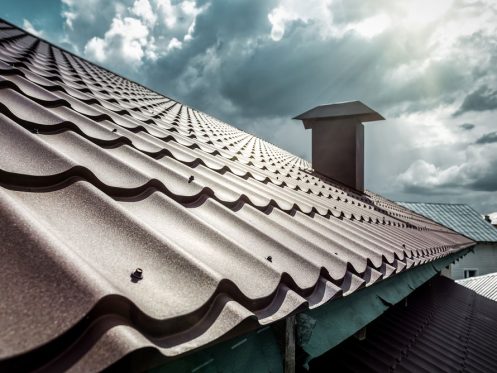If your existing roof is becoming a proverbial headache because of expensive repairs, you might be thinking about getting a metal roof. You may feel that these energy-efficient and low-maintenance materials are perfect for your home. You might even like the soothing sound of rain hitting a tin roof, but that isn’t the only reason why people are going for this option. A growing number of people are using metal roofs in both construction and roof replacement projects, and approximately 750,000 homeowners in the United States chose metal roofing for their places of residence in 2015 (which indicates an 11% market share and the second choice only to asphalt shingles).
Advantages of Metal Roofs
Metal roofs can have several advantages, which can include but may not be limited to:
- Durability and Longevity — Its long lifespan is why many homeowners are switching to metal roofing panels in either a re-roofing or new construction project. In fact, 26% of homeowners said that longevity was the main reason why they invested in metal roofing.
- Twenty-two percent were attracted to its strength. If it’s properly installed, a metal roof will last as long as the house with an expected life expectancy of 40-70 years. Many manufacturers will include a warranty of 30-50 years. You can also expect it to withstand wind gusts of up to 140 miles per hour along with some resistance to corrosion and cracking due to rust-proof coatings.
- Environmentally-Friendly — Asphalt shingles are petroleum-based, so it depends on fossil fuels to manufacture. They also need to be replaced every 15-20 years, which means that nearly 20 billion pounds of old asphalt shingles are dumped into landfills every year. Metal roofs, on the other hand, are more sustainable alternatives for a number of reasons. Many metal roofing panels are made out of 25% recycled material and can even be recycled themselves. This makes metal roofing an ideal platform for homeowners who are looking for more eco-friendly initiatives (such as solar panels and systems for harvesting rainwater).
- Energy Efficiency — The extra money that you’ll spend on metal roofing can be made up by what you’ll save in monthly cooling and heating costs because it has certain reflective properties. Metal roofs can reflect solar radiation instead of absorbing it, which can be helpful in the long and hot days of summer. This can lower your cooling costs by as much as 25%, and some metal roofing panels are coated with special reflective pigments that are designed to minimize heat gain, which can keep you and your family comfortable without having to turn up the air conditioner.
- Style — Metal roofing has come a long way from the corrugated tin barns of days past. Now, you can choose from a number of options (such as zinc, aluminum, copper, or even galvanized steel) in a variety of colors, finishes, and shapes. Asphalt shingles may offer 15-20 different color schemes, but metal roofing panels can come in more than 100 different colors (which can include, standard, premium, and custom hues).
Be sure to speak to a roofing professional for more information.
Disadvantages of Metal Roofing
Despite their advantages, metal roofing panels have the following disadvantages:
- Extra Cost — The many years of service that a metal roof promises come with a high price tag. The materials can cost from $120 to $900 per 100 square feet (or one “square” of material). While this cost is comparable to that of other premium roofing products, higher-end metals can cost up to 10 times more than asphalt shingles. The installation costs are also more expensive than what you would pay for other types of roofing because of the special training, knowledge, tools, and equipment it requires. It doesn’t mean you won’t be able to get back the money you spend on your initial investment because unlike asphalt shingles (which will have to be replaced several times throughout the life of your home), a high-quality metal roof could be the last replacement you’ll ever need.
- Prone to Denting — While modern metal roofs can withstand decades of abuse from extreme weather, some of them can be dented by large hail or falling branches. Depending on the type of roof you install, you might not be able to walk on it without causing damage. If this disadvantage is a potential deal-breaker, it can be avoided if you choose the right shingle (preferably one that comes with a guarantee to never dent).
- Noisiness — While you could list it as a potential drawback, it’s not a massive one. Metal is noisier than other types of roofing, especially during heavy rain or thunderstorms. But, installing extra layers of solid sheathing or insulation will usually minimize the sound you hear inside.
If you’re looking for one of the best roofers in Corpus Christi to help you with your next roof installation or replacement, be sure to get in touch with Bayfront Roofing and Construction.
